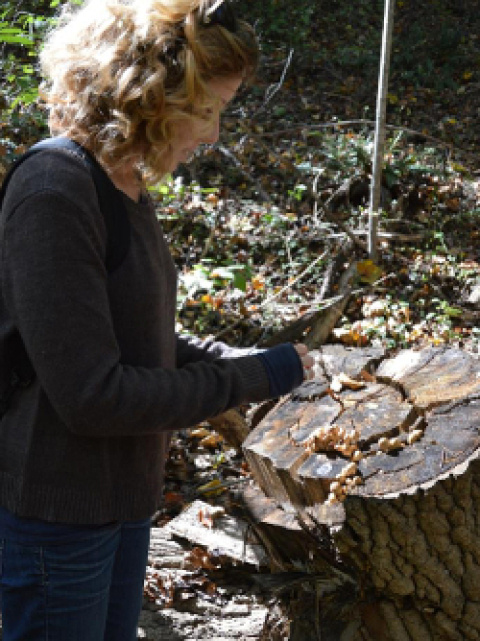Focus at BETO: Biofeedstock production, algae, reducing the cost barriers to biofuel production
Prior Experience: Postdoctoral Researcher at MTT Agrifood and Biotech in Jokioinen, Finland; Ph.D. in Biology from Arizona State University
Duration of Fellowship: September 2012–February 2014
Career Interests: Food and energy production in response to climate change
Favorite Thing About Living and Working in Washington, D.C.: "D.C. is a hotbed of ideas, cross-cultural fertilization, and burgeoning stereotypes, all of which allows one to learn about what is going on in the world and how people work tenaciously toward creating change."
Cyd's Story:
Cyd Hamilton came to the Bioenergy Technologies Office (BETO) as a researcher in ecology and the fungal sciences, already authoring 12 academic papers. She left better connected to the policy community and with an understanding and appreciation for how government agencies function and contribute to private-public partnerships in her field.
Prior to her Ph.D., Cyd had worked as a botanist for the U.S. Department of Agriculture and an intern at the Arizona State Senate Committee on Commerce, Agriculture, and Natural Resources. As a fellow at BETO, Cyd discovered two things: First, the barriers to federal interagency cooperation, and second, the self-awareness of government agencies and their engagement to reduce those barriers.
At BETO, Cyd worked with the algal program, using her expertise in ecology to inform potential research and development trajectories to reduce the costs of biofeedstock production, while maintaining economic and environmental sustainability. She published a paper on her work (see below) and further explored opportunities to find economically and environmentally sustainable pathways through the Symbiosis Biofeedstock Conference in June 2013. Cyd took the lead role in planning and organizing the conference, which involved participants from private industry, academia, and several national labs. She secured the location, invited attendees, and wrote the accompanying report.
Through her AAAS fellowship, Cyd was able to collaborate with other organizations, including the Intergovernmental Panel on Climate Change, the Fish and Wildlife Service, and Global Environment Fund. She is currently working with the AAAS Fellows and Alumni to help organize a Summit—United States Climate Change Resilience: Governance and Reforms.
Since completing her AAAS fellowship at BETO, she has accepted a fellowship as a visiting scientist at Oak Ridge National Laboratory. She said that her experience at BETO provided her with new career paths she did not know existed.
- Exploring the Utilization of Complex Algal Communities to Address Algal Pond Crash and Increase Annual Biomass Production for Algal Biofuels by AAAS Fellow Cyd E. Hamilton, Ph.D.
<p>"My fellowship made me more aware of collaborations between science, industry, and agency at both national and international scales.</p><p>"It is not an easy fellowship, and it is challenging—and I would do it again in a heartbeat."</p><p>—Cyd Hamilton</p>


